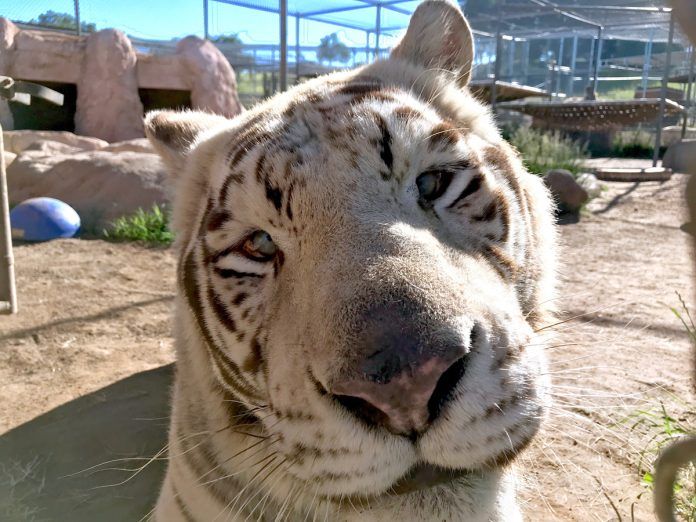Wildlife trafficking is a multibillion-dollar industry, ranking just behind drugs, weapons, and human trafficking. Every week, cases of animals being bought, sold, smuggled, or exploited in roadside zoos, private backyards, and traveling shows.
Bobbi Brinks sees it all firsthand. She’s the founder of Lions Tigers & Bears, an accredited sanctuary in Alpine that provides permanent homes for rescued big cats, bears, and other exotic animals.
“Animal trafficking is the illegal buying, selling, and transporting of wild animals,” Brinks said. “These animals are often bred for profit, sold as pets, used for entertainment, or exploited for cub petting and photo opportunities. It’s a cruel industry that treats living, breathing beings as commodities rather than respecting them as wild animals.”
California has banned private ownership of big cats and outlawed the use of wild animals in circuses. The federal Big Cat Public Safety Act has helped, too. But Brinks warns that loopholes remain.
“As a border state, we’re still at risk — exotic animals are smuggled across the border all the time,” she said. “What California needs now is stronger enforcement at the borders, tougher penalties for violators, and more resources for rescues and sanctuary placements. Laws are only as effective as the commitment to enforce them.”
Her sanctuary spans 142 acres and is home to more than 60 animals. It operates with 130-plus volunteers and 25 staff members, but space and funding are constant challenges.
Brinks, 58, lives on-site and calls the work a 24/7 job. She started working with animals in the early 1990s and founded Lions, Tigers & Bears in 2002. She also has two house cats, and her husband, semi-retired, helps out when he can.
“We wish we could take them all, but we can’t,” Brinks said.
“When our sanctuary is at capacity, we work with a network of reputable sanctuaries across the country. Unfortunately, there aren’t enough accredited sanctuaries for all the animals in need. That’s why prevention and stronger laws are so critical.”
The work often intersects with other crimes. Brinks recalled a raid in Oregon where authorities discovered $1 million in cash, illegal weapons, and drugs — along with more than 300 animals.
“These industries are interconnected,” she said. “A lot of times, the people involved in the exotic animal trade are also involved in drugs and weapons. The animals are just another commodity.”
Some residents carry Hollywood backstories. ‘Rocky’ the bear, for example, was once trained to wrestle actors on movie sets. When he killed his trainer, the industry cast him aside. He’s been at Lions, Tigers & Bears ever since.
“Animals like Rocky remind us that the novelty wears off,” Brinks said. “When the cool factor fades, the animals are left with nowhere to go.”
The sanctuary is open to the public and offers educational visits, summer camps, overnight stays, and corporate events, as well as weddings and other special gatherings. Brinks emphasizes that education is a critical part of the mission.
“People don’t always realize they’re supporting something cruel,” she said. “When you pay to take a picture with a baby tiger, you’re funding an industry that breeds animals, kills them when they get too big, and starts the cycle over again.”
Lions Tigers & Bears receives no government funding. It relies entirely on donations, memberships, and events to cover food, medical care, habitat construction, and daily care.
“The most important thing people can do is never support the trade,” Brinks said. “Don’t buy exotic pets, don’t visit cub-petting facilities or traveling shows. Support accredited sanctuaries. Every voice matters in putting an end to this cruel cycle.”














